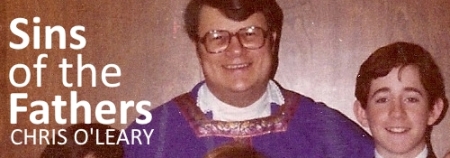
|
| ChrisOLeary.com > Sins of the Fathers > Cognitive Behavioral Therapy (CBT) |
|
I've been through a lot. Sexual exploitation, abuse, and rape by a priest. And worse. But I've managed to survive it. How? I'm lucky to have an (eventually) very supportive family. Thanks to Obamacare, I've also been able to afford an anti-depressant named Sertraline (generic Zoloft). I take 200 milligrams per day and, while it doesn't make everything go away, it certainly takes the edge off. But one thing has helped me more than anything. Cognitive Behavioral Therapy (CBT)My abuse took place in St. Louis, but I went to college in Texas where my symptoms pretty much completely disappeared on their own. However, for family and other reasons, my (now ex-)wife and I decided to settle down and start a family back in St. Louis. Within a few months, I was experiencing bouts of depression. I didn't know why, and now's not the time to go into it, but things got bad, quickly. REALLY bad. Fortunately, I was smart and, after a couple of months, went to the student health services at Washington University in St. Louis, where I was getting an M.B.A., seeking help. While I ended up getting a prescription for Prozac, the more important thing I was given was a book. This book is an incredibly extensive overview of an idea called Cognitive-Behavioral Therapy (CBT). While its being extensive is good, it can also be a bit intimidating. As a result, I want to put together a quick primer that explains what helped me the most. The Essence of CBTThe essence of Cognitive-Behavioral Therapy (CBT) is that those negative — or REALLY negative — thoughts that pop into your head are normal. EVERYBODY gets them. Some more intensely than others. But EVERYBODY gets them. EVERYBODY. You're not crazy. You're normal The thing that many people have learned — and that CBT is all about — is that YOU CAN CONTROL THEM. And, if you learn to controld them, THEY WILL GO AWAY. Not completely, but largely. Everybody gets those thoughts. What healthy people do is they learn to — I was going to say tune them out, but that's not quite right, at least for me — ignore them. It's like when you're on a plane and you don't want to talk to anyone but the person next to you wants to talk. It's not necessarily the most polite thing to do, but if you need to not talk, what works is to simply ignore the other person. After a while, they will get the hint and shut up. CBT is very much like that. Some part of your brain — maybe it's the voice of one of your parents and maybe it's Satan — just won't shut up. And the stuff it keeps bringing up is at best negative. But you need to understand that you have control. You can decide whether to listen or not. It's not always easy, and oftentimes it can require music or TV to drown out the voice, but it can be done. And, more importantly, the harder you work to ignore That Voice, the less it will talk to you. It's like the seed of a particularly nasty weed that is blown on the wind and lands on the ground. If you tend it and feed it and water it, it will implant and start growing and growing and get bigger and bigger. Conversely, if you ignore it — and more important DON'T FEED IT — it won't grow. It will just lay there and bake in the sun and, eventually will die. No, it won't immediately go away. It's still there. Just sitting there. Waiting for you to feed it. But you don't have to. You have a choice. YOU ARE IN CONTROL. You don't have to feed it. Remember, it's a nasty weed, and feeding it will only make it take root and grow. |